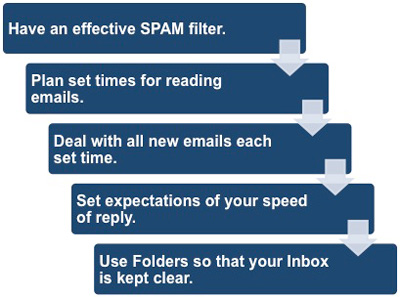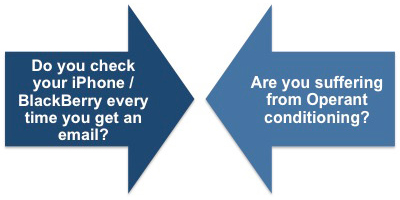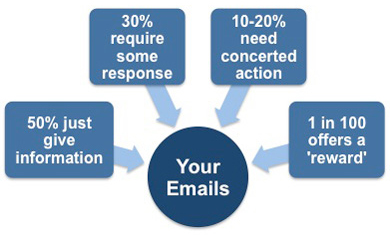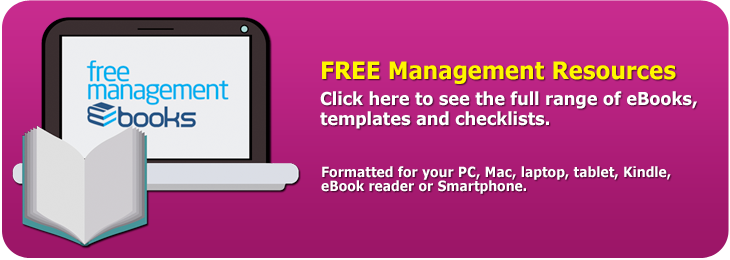How to Stop Constantly Checking Emails
The ubiquity of Smartphones means that most people are now in the situation where they have emails arriving every few minutes. The problem is that it is impossible to know whether an email is important or trivial without looking at it.
This means that many people now feel obliged to check their phone every time an arriving email announces itself with a bleep or vibration. This is extremely disruptive and explains the incredibly short period of time that people are able to concentrate on a single task, as described in the introduction to this eBook. Ten years ago incoming phone calls would have been the biggest source of interruptions, whereas this has now been overtaken by email.
The only way to avoid being interrupted quite so often is to make it clear to your work colleagues that you check your emails at particular times and if they need an urgent response then they should call you. This is usually quite difficult to get across and you will have to accept that you will upset some people by not replying to their emails straightaway. Unfortunately, there is no easy answer to this problem.
There are certain behaviors and useful techniques that you can adopt to ensure your productivity remains high whilst dealing with your emails.
 |
- Have an effective SPAM filter set up and make use of the 'block sender' facility for any unsolicited emails that the filter misses.
- Assign set times (three or four during the day, with the last being just before you plan to leave) to read and respond to emails that are appropriate to your role. Don't look at them every time one lands in your inbox; the only exception to this is when you are expecting a reply that directly effects what you are working on.
- Reply to each email in each session and don't leave any 'unread.'
- The speed and nature of your replies sets expectations. If your co-workers start to see you consistently returning emails within hours rather than seconds, they will tend to back off on the stream of requests and will often bother someone else or find the information themselves.
- Move emails to an appropriate file or delete them to keep your inbox clear.
Since emails are now the single biggest cause of interruptions, and almost half of the interruptions people suffer are self-inflicted, it is worth asking yourself whether your own behavior is having a negative impact on your productivity. Many people know instinctively that they are checking their emails too often but they feel unable to stop doing so.
The popular press and media have run stories on 'smartphone addiction' and it has become something of a cliché. However, there is ample evidence to suggest that many people don't feel completely in control of how often they check incoming messages. Rather than dismiss this, it is worth considering whether there is any psychological basis as to why this may be happening.
Operant conditioning is a form of learning during which an individual modifies the occurrence and form of their own behavior due to the reinforcement of consequences of that behavior. Operant conditioning is so called because it deals with the modification of voluntary (operant) behavior. Positive reinforcement occurs when a response is followed by a stimulus that is rewarding, increasing the frequency of the behavior.
It has been proven experimentally that if you want to train an animal to do something, consistently rewarding that behavior is not the best way. Instead, the most effective training regime is one where you only occasionally give the animal a reward, and then only at random intervals. This is called 'variable interval reinforcement.'
As you know from your own experience, most emails are fairly trivial but occasionally you will receive one that is rewarding in some way. This may be nothing to do with work; it could be a social invitation, something really funny, or some other piece of good news.
 |
Checking your email will eventually get you one of these rewards and because you never know which occasion you check will produce the reward, constant checking is reinforced, even if most of the time it turns out to have been worthless. You still check because you never know when the reward will come. This is a perfect example of 'variable interval reinforcement.'
This is the psychological basis of the constant email checking that you can observe in any office, on the train, or anywhere where people with email can access the Internet. Far from being a trivial problem, it is becoming recognized as a real productivity killer because it prevents you from focusing one hundred percent on a task for any meaningful length of time.
If you feel that your email checking behavior is having a negative impact on your productivity, then you need to take action to correct it, as it is unlikely to correct itself. Remember, most emails just aren't that important.
Typically, over half of your emails will be just passing information, about a third will require some action on your part, and maybe 10-20 percent will need some sort of concerted action. Maybe one in a hundred will represent some sort of 'reward' and it will still be there when you eventually get to it.
 |
As it is so difficult to ignore incoming emails, the best thing is to close your email application completely. If this is not possible, then turn off cell phone alerts and keep your email application minimized. Given the amount of emails that you receive, it is usually necessary to have an organized system for dealing with them in batches, as just 'checking' it seldom achieves very much.
You may also be interested in:
Handling Interruptions | Controlling Interruptions | Identifying Interruptions | Limiting Inappropriate Socializing | Techniques to Minimize Interruptions | Managing Phone Interruptions | Cold Call Elimination | Managing Your Outbound Calls.
|
|
 |


